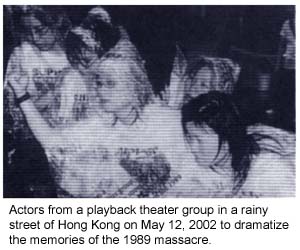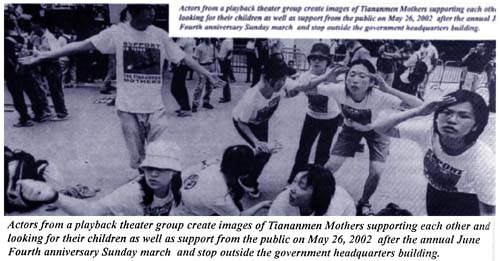New Hopes for Ending Impunity in China
By Chine Chan and Virginia Lai 1
 On March 3, 2003, Just before the start of the China’s People’s Congress (NPC), 115 Tiananmen Mothers sent their open letter presenting their demands to the new leaders to reveal the truth and to seek justice.
On March 3, 2003, Just before the start of the China’s People’s Congress (NPC), 115 Tiananmen Mothers sent their open letter presenting their demands to the new leaders to reveal the truth and to seek justice.
This open letters reveals publicly for the first time that a substantial number of people are still missing following the violent military crackdown in June of 1989. According to the Tiananmen Mothers, available information identifies at least twelve people whose whereabouts remain unknown since the massacre. These individuals appear to have vanished from the earth, leaving the families in despair and dread for almost 14 years. The open letter calls on the Chinese government to give full account of the whereabouts and the fate of these people. If any of them are determined to be dead, the government has the responsibility to return their bodies or remains to their families. Whereas if any of their bodies were destroyed, the government has to give a full account and confess what it did to people.
The open letter also represents three other demands to the new standing Committee of the
NPC:
1. Establish an investigatory body to conduct an independent inquiry into the massacre and publicize its findings, including a comprehensive list providing the number and names of those killed;
2. Push the government to provide a full report to each family of those killed, and offer appropriate legal and financial remedies; and
3. Request the Procuratorate to investigate which members of the leadership were responsible for the tragedy and make them legally accountable.
The above three requests have been sent to the new Chinese leaders and the Supreme People’s Procuratorate of China many times during the past eight years but the Tiananmen Mothers have never receive any reply.
Despite the difficulties they have been facing in China, the Tiananmen Mothers get lots of international support. At the time of the changes of new leaders of the Chinese Communist Party and the Chinese Central Government in November 2002, Tiananmen Mothers issued an open letter urging the 16th Central Committee of the Communist Party to act on their demands for seeking justice for the victims and a more democratic system in China. This goal has yet to be realized in China.
International solidarity campaigns have been crucial in supporting such civil campaigns against impunity. Since the support of people in international society means a great deal, the Tiananmen Mothers Campaign is asking people from all walks of life to endorse the petition and demonstrate their support for the Tiananmen Mothers in a variety of ways.
New Hope Despite Disappointment Again and Again
Many people hope that after the leadership of the late paramount leader Deng Xiaopin, President Jiang Zemin, Premier Zhu Rongji and former Premier Li Peng are believe to be the ones who gave the order for the massacre. There might be new hope in a newer generation of leaders – Hu Jintao and Wen Jiabao – to have a review of the 1989 June Fourth massacre, which still a taboo topic in mainland China.
Wu and Wen are believed when they try to give people an impression that they are more open. They even ask for carrying out further legal reforms and requested bureaucratic institutions to face and deal with people’s demands. But whether the demands of the Mothers will be addressed or not is too early to tell.
Contrary to this slight good will and openness, the government at the same time is also tightening the suppression of freedom of expression. Before the NPC started, some outspoken journalists on pressing social issues were forced by government agents to leave their places of work or living and to travel to other parts of the nation. Several well-known dissidents related to the June Fourth massacre issues, including intellectual and activist Liu Xiaobo, have been either put under arrest or forced to leave Beijing where the NPC meetings are being held. Liu was prevented from delivering an open letter to the congress meeting protesting against the detention of a student internet activist. He was one of the lecturer who fully supported the students’ democratic movement in 1989and works closely with Tiananmen Mothers, Dr. Ding Zilin, the first courageous mother to stand up and speak out the truth of her son’s death.
Barriers Faced by Tiananmen Mother’s Network
From time to time, the Tiananmen Mother’s need to get support from friends in many ways especially when they have difficulties in networking communication among themselves. Liu Xiaobo is one of their friends who has been offering help.
It is never easy for the mothers to come together and put together an open petition paper. Dr. Ding Zilin has been taken up this hard and heavy work to coordinate with the mothers to support each other and campaign for their demands. Since the phone line at her home is being tapped, she needs to run around to borrowed phones on the streets to come into contact with other families and reach any agreement of a concerted action. This is extremely difficult especially when she is under many types of suppression and out under strict surveillance from time to time. For instance, during some sensitive dates such as the meetings of the National People’s Congress, a visit by the high Commissioner of Human Rights Mary Robinson, the National Day or around June 4th, she would be under house arrest and her house surrounded by plainclothes agents. Even if she just wants to go out to by food, she is followed closely by the police.
Sometimes the police send people to harass her. Some people approach her house and yell abusive words at her. Other mothers also face different kinds of harassment. They would be chased when they visit the graveyard for mourning their beloved children who where killed in the massacre.
Hong Kong Based Tiananmen Mothers Campaign Groups
In Hong Kong, some local groups have launched a global campaing – Tiananmen Mothers Campaign (TMC) – to support the Tiananmen Mothers in China in 2000. Hong Kong is a tiny piece at the Southern tip of China, which used to have a comparatively a higher degree of democracy and freedom under the policy of “one China and two systems,” though these are diminishing in many ways after the handover to Mainland China in 1997.
This year, the Hong Kong based campaign is focusing on exerting pressure on the government and the new leaders to break the ice to undergo a thorough investigation into the massacre and hold those human rights perpetrators accountable. The campaign group issued a new petition card to encourage people to support the Tiananmen Mothers and campaign by mailing the cards to Han Zhubin, Procurator-General of the Supreme People’s Procuratorate of China to support their struggle for justice.
A head of the coming of the 14th anniversary of June 4th, TMC is also preparing for promoting human rights education, one of the cores of campaign work, infiltrating into schools in a more in-depth way. In 2002, TMC tried to use the cultural activism approach. It brought theater performance – Playback Theater – into secondary schools. Through improvisational Playback Theater performances, People realize that the June Fourth massacre was not merely the history of the “heroes” or the “victims” the victims’ families or those involved in the 1989 student movement. It is their history too. Playback Theater emphasizes the spirit of equality and freedom in making space to voice people’s memories, thoughts and feelings, whish are consistent with the basic principle of the Tiananmen Mothers Campaign.
Background of Tiananmen Mothers
In June 1989, the Chinese government violently suppressed the peaceful civilian demonstrations of students, workers and other citizens in Beijing. After the massacre, families of victims of massacre banded together to provide mutual support to each other and work together to collect information about the reality of the brutality of the crackdown. They challenged the official lies about what really happened on the night of June 3 until the morning of June 4. They demand for legal accountability for the crimes committed in the massacre to hold human rights perpetrators without impunity.
Mothers of people detained, disappeared and killed have been at the forefront of such campaigns, bravely facing intimidation and persecution from the government, which thus far, has not provided an official accounting for the civilian killed and wounded and made no attempt to investigate what really happened, except in the crudest political terms. The government failed to admit and redress the massacre. Its attempt to impose collective amnesia is encourage by the nation’s deafening silence on the matter.
Over the first ten years, the June Fourth victims’ network has documented the deaths and the wounded and compiled a list of 155 dead and 65 wounded, containing names and other details of victims ranging from nine to 61 years of age. In 1999, they took on unprecedented step of submitting the evidence they have painstakingly collected to the Supreme People’s Procuratorate, China’s Prosecutor General. They demanded for a thorough investigation into the “June Fourth Incident” to determine legal responsibility for the loss of lives and the use of excessive force by troops, requesting specifically that the culpability of leaders such as former Premier Li Peng be determined.
Although the Procuratorate is required by Chinese law to respond to such petitions requesting a criminal investigation, there has been a stony silence. The families reportedly wrote a request a reply and called for a public and impartial inquiry as well as compensation for the families of those massacred and injured. Despite years of struggle, they have never received any response from the Procuratorate or the government except persistent intimidation and persecution. Hitherto, those who are held responsible for the massacre have not been punished.
It has been nearly 14 years since martial law troops, comprising soldiers of the People’s Liberation Army and of the People Armed Police opened fire on the unarmed people of Beijing on the night of June 3, initiating a massacre that took the lives of young and old all over the capital city. The military crackdown is believed to have resulted to thousands of death, disappeared and injured. The appeal or petition actions of the victims or families of victims are simply an attempt to find justice for the dead and to fight for the human dignity of the living. The Tiananmen Mothers see their mission as going beyond the issue of their own children’s fate. Their struggle is crucial in preventing such massacres and human rights abuses from happening again in the future. Ending impunity is the utmost importance for building up a system of justice in China.
If there is a lack of accountability for human rights violations, be they coming from members of the military, police and other armed forces or even death squads – they are tolerated by the government and perpetrators of rights abuses are not punished for their actions. This sends a very clear message that such crimes are condoned by the state and that the government can kill, torture or commit enforced disappearances without fearing of being brought to justice. Therefore, the struggle against impunity is an essential part of the struggle for human rights. Only when all human rights violators are held accountable for their actions can we hope that human rights violations will cease and justice will prevail.
We hope others will also take up this effort, recognizing the importance of the struggle against impunity for establishing effective protection for human rights in China.
